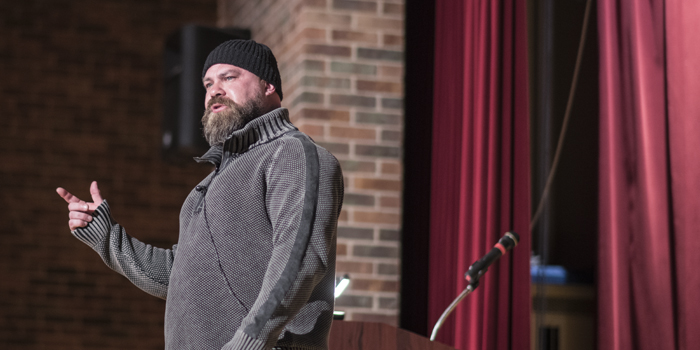
In the introduction to his presentation at the 2018 elitefts Sports Performance Summit, Jim Wendler discussed the level of preparedness of youth athletes today and his role as strength and conditioning coach for the London High School football team. Now in this second video, he begins to go into detail about the changes he made from the 2016 season to the 2017 season to lead to a dramatic turnaround in the team's success.
Wendler started as a football coach (not a strength and conditioning coach) at the beginning of the 2016 off-season when the team was doing summer two-a-days. At this point, he wasn't running the strength and conditioning for the team. During that year as he served as a sport coach, the 2016 season was as bad as he could have possibly imagined. The kids got demolished almost every single game and won only three games the entire season — and one of the wins was against a team that ranks as one of the worst Wendler has seen his entire life. They won that game by one touchdown. The team also had injury issues and positional changes that hurt them all season long.
Mid-season, Wendler decided to take over strength and conditioning for the athletes. But because it was in-season training, Wendler was very limited in options with the team. He explains that his limitations were due to not having controlled the off-season; what you're capable of doing in-season is dependent on what you did during the off-season, and because Jim wasn't in control of the off-season, he had to make the best of what he had to work with.
Once 2016 ended, within one week Wendler had nearly 100% of the athletes show up for off-season training. The resulting turnaround from 2016 to 2017 was drastic: they went 8-3 in the regular season, won the conference, and made the playoffs for the first time in 20 years. When Wendler took over the training, the team had no identity and had no idea what they were going to be as they entered the 2017 season. What they became was the strongest team on the field every night they played.
To begin making changes, Wendler flipped the entire 2016 training philosophy on its head. What they had been doing for the previous season wasn't working and there was nothing that could've made them worse . Why not change everything? So Wendler made changes. They didn't condition a single time the entire season. They stopped doing two-a-days. They lifted to keep the kids fresh instead of letting them beat each other up on the field. The athletes were fit enough that they didn't need the extra work to get in shape, so they stopped doing it.
Throughout this entire process, Wendler and Kyle, the head football coach, worked closely together. Wendler points out that there are two types of coaches: those who do things the way they were taught, and those who do things the way they should be done. Romanticizing the "old days" doesn't work. You can't build your training approach based on the idea that you were tougher back in the day. Wendler gives a lot of credit to Kyle and their relationship of forcing each other to think intentionally about their training plans and adjustments. This led to daily adjustments for the players as well as big-picture training plan changes. For instance, if you had a bench press contest on Friday, would you bench press on Monday, Tuesday, and Wednesday, expecting to be strong on Friday? You wouldn't, so why run football players into the ground with hard practice at the beginning of the week before a Friday game? This is just one example of the decisions they made together.
RELATED: In-Season Softball Training Guidelines and Myths
Wendler goes on to point out that strength and conditioning coaches need to remember their role and be aware that the head coach is in charge. If you're a strength coach, work with your sport coach and get them on the same page. They're going to have the final say and you need to be aligned with them, even if it means you have to work really hard to help them understand your perspective. This was instrumental in Wendler and the football team finding success.
Wendler ends this portion of his presentation by sharing the off-season attitude the team had between the 2016 and 2017 seasons. With the massive failure of the team, they were in a great place for a massive turnaround and massive success because they weren't tied to any old ways of doing things. Wendler based his coaching approach on getting the athletes to give everything they had on each exercise or drill, without worrying about the end results. His mindset was that it never matters how many wins or losses the team has; he doesn't care. All that mattered to him at this stage was their effort on that exercise or that day. Win the small battles, and as you win more and more battles, the score will take care of itself.









